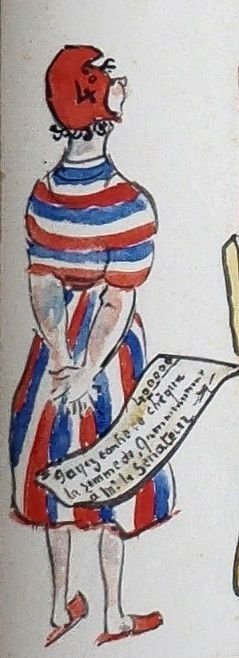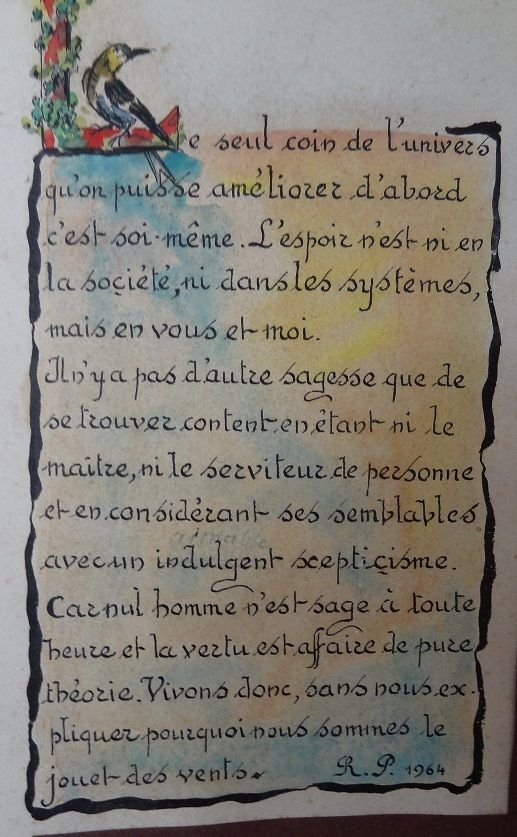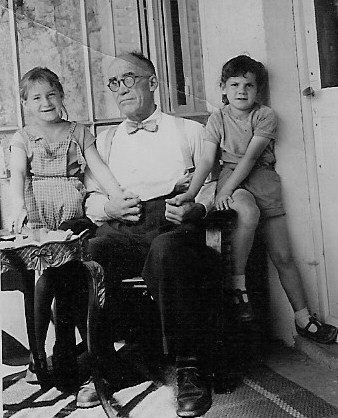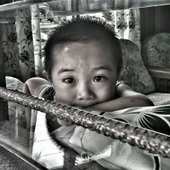My great-grandfather was secretary of the socialist party of a small village in Burgundy. He liked politics and led a politically engaged life especially throughout his retirement years.
Thanks to him, local farmers of his region succeeded in creating a group called CUMA, a form of agricultural cooperative society that allows farmers to pool their resources to acquire farm equipment.
The local elections were always very active and my great-grandfather could often be found putting up political posters and tearing down those of competitors.
Unfortunately, he never ran for Mayor as his left-wing ideas were not well accepted in his village. Neither the rich right-wing nor left-wing farmers could understand that the son of an upper-class family would represent them well enough.
The drawings and paintings that follow reflect in two different categories the style of his works and the life he led.
Drawings
_edited.jpg)
This drawing is neither dated nor explained, which makes it a bit difficult to describe accurately. There could very well be a connection with politics as my great-grandfather was an active member of the political sphere. It could also find meaning through the devaluation of the franc which occured in the 1960's.
We see all kinds of people running after a 1 franc coin which I am sure you can all understand and relate to.
Money has become the only thing of interest in our society. Be it the young, the rich winemakers, the peasant women and the elderly, all run after money, always more money - even if it means stepping on one another.
What do you think? Does this drawing feel accurate to you? Would you add an element to it? Would you take something out and replace it with something else? Or are you, like me, really dying to grab your crayons and color it?

Watercolours
_edited.jpg)

On September 28, 1958, the president of France, General Charles De Gaulle proposed a referendum to approve the constitution of the 5th Republic.
In this watercolour, my great-grandfather has represented a page of the newspaper which, in France, was and is still popularly nicknamed: le canard. (which literally translates to "the duck").
Why call a newspaper a duck? Well, from the 13th century, the name of this animal, which can be described as loud and noisy, was used to describe people who were too talkative. The term was then used in the expression (now extinct) "to spread a duck" (repandre un canard), which meant telling a lie or fooling someone.
In this logic, "canard" was used to designate the modest news bulletins distributed in the street in the 18th and 19th century. Often dealing with minor news items, they had the reputation of reporting false information, which did not prevent them from becoming popular!
The "duck" ended up referring to the unreliable newspapers, then to the press in general.
This would explain the painting of the duck in the top left corner wearing a banner with the name of the newspaper: Le Courier.
At the center of the poster is a photo of elected officials from the region: Mayor, Member of Parliament and Senator. They met to explain and convince the people, essentially peasants and farmers, that it is necessary to vote FOR the 5th Republic.
The painting of men distributing OUI/YES votes to the peasants to convince them are most certainly a representation of the men seen in the photo.
I think the title "Honneur aux Paysans", which means Honor to the Peasants, is a bit ironic. It is a way of flattering the rural community to obtain their vote whereas usually one hardly considers their opinion (yet I am not entirely sure that this is what my great-grandfather was insinuating).
Side note: the Fourth Republic was established on October 13, 1946 and lasted until the adoption by referendum of the Fifth Republic on September 28, 1958.
In September 1958, through a referendum, the French accepted, at a whopping 80%, a new constitution.

This short philosophical text was written by my great-grandfather in 1964. Born in 1894, he would have been exactly 70 years old at the time of writing.
Hope is not in society, nor in the systems, but in you and me.
There is no other wisdom than to find oneself happy by being neither the master nor the servant of anyone, and considering one's fellow-men with indulgent skepticism.
For no man is wise at all times, and virtue is a matter of pure theory.
Let us live without trying to understand why we are at the mercy of the winds.
Translating a philosophical text from French to English is not an easy task so I hope this makes sense to you.
From his words, we can retain 3 main ideas:
- First, to believe in yourself and to do good because it is the men and women who by their actions build a society - and not the other way around.
- Learn to be happy in life and to consider others with respect. Do not lower yourself but do not control, consider others as your equals without being naïve - stay aware.
- Human nature is complex - theory is easy to say, tougher to apply. But in any case, try to live without asking too many questions, as there are no answers.

seen here with my aunt and mom.

 Borneo - portrait photography |  The treasures left behind by my great-grandfather #7 |
|---|---|
 Our unexpected adventure - Reunion island 3 | The treasures left behind by my great-grandfather #6 |
“Learning is not a race for information, it is a walk of discovery” - Jane Healy

